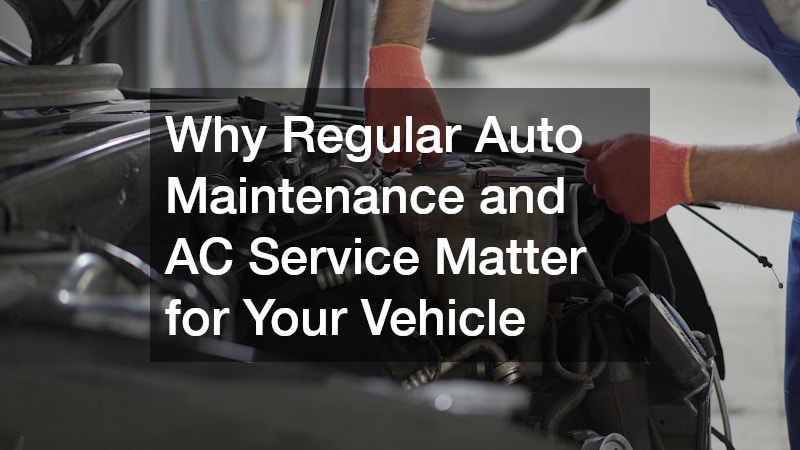In this article, we will explore the importance of regular auto maintenance and air conditioning service for your vehicle, focusing on ensuring longevity, safety, and optimal performance. As a vehicle owner, understanding the critical aspects of maintenance can lead to significant savings and a much more enjoyable driving experience. By addressing both auto maintenance and AC service, we aim to provide a comprehensive guide to keeping your car in top condition.
How Does Regular Auto Maintenance Extend the Life of Your Vehicle?
Regular auto maintenance service is crucial in identifying potential issues before they escalate into costly repairs. Scheduled inspections and services allow mechanics to pinpoint wear and tear, enabling preemptive action.
These preventative measures not only save money but also significantly prolong the life of your vehicle.
For instance, catching a minor oil leak early can prevent severe engine damage later on. A fact to consider is that replacing timing belts periodically can avoid catastrophic engine failures. Thus, proactive maintenance is an investment in your vehicle’s longevity.
Moreover, regular maintenance ensures that all vehicle systems operate smoothly and efficiently. Preventative care often involves systematic checks that can highlight issues not immediately noticeable to drivers. By addressing these issues early, drivers can maintain a higher level of vehicle reliability and safety.
Routine auto maintenance tasks, such as oil changes and tire rotations, are essential for enhancing vehicle performance. Clean oil ensures that engine components work together without friction, improving efficiency and performance. Similarly, rotating tires promotes even wear, ensuring better traction and stability on the road.
Regular maintenance also involves replacing air filters, which improves engine airflow and boosts acceleration. Well-maintained vehicles generally respond better and provide a more comfortable driving experience. Overall, these tasks contribute to a more powerful and efficient vehicle performance.
What Are the Risks of Skipping Regular AC Service?
Driving with a poorly functioning AC system can become a safety hazard, particularly in extreme weather conditions. In sweltering heat, a lack of adequate cooling can lead to driver fatigue and decreased concentration. In turn, this could increase the risk of errors and accidents.
An optimally working AC system ensures comfort, reducing physical stress and distraction. Moreover, it demists the windows faster in humid conditions, improving visibility and safety. For instance, a properly functioning AC is crucial in preventing foggy windows that can obscure a driver’s line of sight.
Ignoring AC maintenance could lead to critical health and safety consequences. Driving with a compromised AC system in extreme temperatures can push the body’s tolerance levels. It’s vital to ensure that car AC systems are regularly serviced to maintain a safe and comfortable driving environment.
Neglecting AC service can lead to more significant and costly repairs in the long run. Components of the AC, such as compressors or condensers, may incur damage if regular service checks are skipped. Over time, minor system inefficiencies can evolve into major mechanical failures requiring expensive repairs.
This preventative maintenance often involves checking refrigerant levels and assessing for leaks or blockages in the system. A thorough inspection can prevent these issues from escalating. By addressing AC maintenance proactively, vehicle owners can avoid comprehensive system damage and the associated costs.
What are the Essential Components of Auto Maintenance?
Routine maintenance includes checks and replacements that ensure the vehicle’s ongoing functionality and safety. Essential tasks like replacing air filters, brake pads, and fluids are critical to vehicle health. These components wear out over time and need periodic attention to maintain overall performance.
Failing to replace them can lead to mechanical failures, reduced safety, and compromised driving conditions. The longevity of a vehicle heavily relies on these routine replacements. Effective maintenance practices keep the vehicle running smoothly and prevent unforeseen breakdowns.
Additionally, regular maintenance checks involve inspecting essential vehicle systems such as brakes, steering, and suspension. These components’ integrity is crucial for safe operation. Routine evaluations ensure that any wear and tear are addressed promptly, maintaining the vehicle’s safety and roadworthiness.
Diagnostics and tune-ups play a vital role in identifying underlying issues and maintaining optimal vehicle performance. Modern vehicles are equipped with complex systems that require diagnostic services to troubleshoot problems effectively. Routine diagnostics can expose minor issues before they evolve into significant concerns.
Tune-ups typically involve adjusting and cleaning vehicle components to ensure everything is running as it should. They are critical for fuel efficiency and reducing emissions. With regular tune-ups, vehicles are less likely to suffer from clogged fuel lines and spark plug issues, which can affect engine performance.
Regular vehicle maintenance, including AC service, is essential for enhancing durability, safety, and performance. Consistent maintenance practices mitigate costly repairs, maintain resale value, and ensure a safe and comfortable driving experience. By investing in routine service, vehicle owners secure long-term financial benefits and enjoy reliable, efficient vehicle performance.




